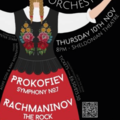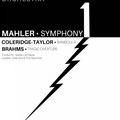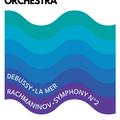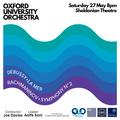2022-23
Thursday 10th November 2022, Sheldonian Theatre
Conducted by Peter Stark
Led by Aoife Soni and Amy Moynihan
Prokofiev Symphony No.7
Rachmaninov The Rock
Lutoslavski Concerto for Orchestra
A review of this concert can be found here:
FIRSTS AND LASTS: OUO MT22 CONCERT REVIEW (oums.co.uk)
FIRSTS AND LASTS: OUO MT22 CONCERT REVIEW
Christopher Churcher reviews OUO’s Michaelmas Term 2022 concert, conducted by Peter Stark, featuring Prokofiev’s Symphony No.7 and Lutosławski’s Concerto for Orchestra.
With the gorgeous, plaintive violin melody which opens Prokofiev’s Symphony No.7, OUO set the tone for a concert of both exuberance and solemnity. The theme of the night seemed to be beginnings and endings, presenting landmark works by two Russian greats: Prokofiev’s bitter-sweet final symphony and Rachmaninov’s first published orchestral work, the symphonic poem The Rock.
It was with the great ending of the programme that the concert began. Although, as the composer’s last completed work, Prokofiev’s melancholy seventh symphony might have seemed an unorthodox choice to open the concert, this decision was quickly justified by the orchestra’s energetic interpretation of the piece. Led enthusiastically by Peter Stark’s playful account of the more balletic passages, the orchestra provided a well-balanced reading, capturing the playfulness of the child-like opening of the fourth movement and the palpable melancholy of the third with equal sensitivity. Although the ensemble was lacking at some unfortunate moments (the lack of coordination between the glockenspiel, xylophone and piano put a slight dampener on the finale), the performance was generally extremely compelling. The appreciative applause at the end of the stirring second movement said it all.
Despite most likely a new work for many in the audience, Rachmaninov’s The Rock really earned its place in the programme. With a brooding, tenebrous opening calling to mind the introduction to his Symphony No.2, and oodles of those decadent, sequential climaxes which became the composer’s lasting calling-card, it’s easy to understand why Tchaikovsky spotted such potential in the twenty-year-old composer’s work. Moreover, The Rock yielded some of the most memorable individual performances of the concert. An uplifting presence throughout, the ornate, interlocking solo figures from Elizabeth Thomas (principal flute) and Alex Buckley (principal clarinet) conjured the ‘lovely young woman’ of Chekov’s short story with poetic simplicity.
The real triumph of the evening, however, came with Lutosławski’s formidable Concerto for Orchestra. Composed in Warsaw at the same time that Prokofiev was finishing his seventh symphony, it was the work that catapulted Lutosławski’s music to the foreground of twentieth-century art music. Thundering unapologetically through the Sheldonian, the orchestra kept the audience on the edge of its seat from the work’s rigid Intrada to the preposterous, thundering coda. Beyond this bombast, the mid-twentieth century growth of interest in the genre of concerto for orchestra also gave composers reason to pen nuanced and soloistic percussion passages (as seen also in the concerti of Thea Musgrave and Béla Bartók), and the Lutosławski is no exception. Despite the somewhat unyielding acoustic of the theatre, the percussion section realised the ominous closing of the second movement with great subtlety, creating one of the most mesmerising moments of the entire programme. All things considered, the stellar performance of this thorny work was a credit to the dedication and musicianship of the orchestra.
Saturday 11th February 2023, Sheldonian Theatre
Conducted by Natalia Luis-Bassa (Principal Guest Conductor)
Led by Aoife Soni and Amy Moynihan
Mahler Symphony No.1
Coleridge-Taylor Bamboula
Brahms Tragic Overture
A review of this concert can be found here:
THUNDERING TRIUMPH: OUO HT23 (oums.co.uk)
THUNDERING TRIUMPH: OUO HT23
The urge to compare music to art is not a new one. Yes, one of them fills space – the other time – and perhaps a painting is altogether more mimetic than a work of music. Yet, the intrigue of the analogy remains. Monet and Debussy, Copland and Wyeth, Kandinsky and Webern, Feldman and Rothko – the resemblances go on. With respect to Mahler, his painterly bedfellow has (to me) always seemed to be a fellow Gustav: Gustav Klimt. These two artists – one of The Kiss, the other of the ‘Titan’ Symphony – were intimately bound by history. In their visceral redefinitions of form and representation, both set Vienna on course to become a centre of modernism in fin-de-siècle Europe. Indeed, much of Mahler’s oeuvre parallels the founding and growth of the Vienna Secession.
The two artists also shared a profound philosophical communion, prospecting growth and decay, love and happiness: themes explored throughout OUO’s concert on 11th February. From the grim introductory hammer-strokes of Brahms’ Tragic Overture, to the riotous ebullience of Coleridge-Taylor’s The Bamboula, and finally the all-encompassing Mahler – the programme moved between emotional antinomies in three works composed within twenty years of each other.
Confounding dichotomies of ‘Classical’ and ‘Romantic,’ Brahms is a difficult composer to interpret. With its brooding undercurrents contained in tightly-rendered formal structures, this account of the Tragic Overture suffered slightly under Natalia Luis-Bassa’s austere baton. At its best, the dusky string textures, and reticent solemnity of the wind Trauermarsch were rendered with great sensitivity, however the recurring tutti dotted motifs and syncopated hammer-stroke figures became simply too officious and belligerent for the music. Any issues in the Brahms were, however, quickly allayed in the Coleridge-Taylor. The orchestra’s nimble reading of this energetic work was utterly pristine, garnished with some colourful glockenspiel playing, and superbly confident brass entries.
The centrepiece of the concert was understandably the Mahler, and it was with this vast work that the orchestra came into its own. The Sheldonian was brought to life with off-stage brass fanfares, and trilling bird-calls from principal flautist Amy Fry, as Mahler’s musical landscapes took form. Luis-Bassa’s reading was lithe and sparkling, avoiding the dispensable Schlagobers in which so many conductors love to indulge when conducting Mahler. From the numinous, trance-like opening, Mahler’s congenial ‘Ging heut’ Morgen über’s Feld’ was introduced unhurriedly by the ‘celli, as the intensity of the first movement was given space to unfold gradually, like rolling fields of Alpine pasture. The symphony continued in the same sympathetic vein, bringing out moments of theatrical vitality (the bleating, stopped horns of the second movement translated beautifully in the Sheldonian), but also allowing the music to breathe when necessary. The palpable sense of ensemble in the strings, led by Amy Moynihan, lent a tenderness and chamber-like quality to the ‘zwei blauen Augen’ theme of the third movement, enriched by soft glissandi in the ‘celli.
The precursory restraint allowed the opening measures of the final movement to thunder with shocking potency, shaking the theatre as they must have done first at the 1889 Hungarian premiere. From this preliminary ‘outcry of a wounded heart,’ the thunderclaps and jousting motivic passages of the ensuing music advanced from tragedy to triumph, and the final climax was roof-raising. With glistering cymbals and bipedal declamations of ‘and he shall reign’ in the horns - led securely throughout by Tommaso Rusconi - the symphony that begins with the dawn of life ended in a blaze of fire: a Klimtian spectacle, with equal measures of sparkling gold and heartfelt shade.
Saturday 27th May 2023, Sheldonian Theatre
Conducted by Joe Davies, as part of the Early Career Conductors Scheme
Led by Aoife Soni
Rachmaninov Symphony No.2
Debussy La Mer
On Saturday 27th of May at 8pm, the Orchestra performed Debussy's La Mer and Rachmaninoff's Symphony No.2 at the historic Sheldonian Theatre in the heart of Oxford. OUO were under the baton of alumnus Joe Davies for his OUO debut. Joe conducted the Oxford University Chorus and the Oxford University Symphonic Band while studying here. He is now a professional conductor taking up engagements across the country, and we are thrilled to be welcoming him back to Oxford, as part of our Early Career Conductors Scheme.
A review of this concert can be found here:
'A wholly immersive experience' - OUO TT23 Review (oums.co.uk)
'A wholly immersive experience'
Oxford University Orchestra’s Trinity term concert featured two momentous early twentieth century symphonic works – Debussy’s La Mer and Rachmaninov’s Symphony No 2. It was a lovely pairing of two iconic works which the orchestra evidently enjoyed performing. From the introductory motif of La Mer to the final triplet of the Rachmaninov symphony, there was a real sense that the orchestra was alive, swelling, and moving with the music. Such a display of passion and genuine love for the music being performed made such a difference to the audience’s satisfaction.Watching such an orchestra made the concert a wholly immersive experience.
The orchestra’s performance of Debussy’s La Mer showcased Debussy’s compositional style, and the orchestra did an excellent job in its rendition of each movement’s idiosyncrasies. The mysterious quality of the first movement started off finely, with the cor anglais and muted trumpet creating a unique timbre. Intonation, especially in difficult string passages, was consistent throughout the first movement. In the second movement, the interplay between the cor anglais, flute, and oboe was playful and exciting, and embellishments by the percussion and harp were crisp. The third movement displayed the serene as well as more forceful moods, with graceful and soaring wind solos suddenly being undercut by precisely articulated brass fanfares. The trumpet solo (performed by Guy Barwell) in the third movement was fantastic. What made OUO’s rendition of La Mer especially stylish was the fact that not once was sound forced, helping immerse us in Debussy’s unique sound world. Instead, sound seamlessly emanated from every section, allowing for woodwind solos to subtly creep in, and more generally small details and intricacies to be heard, even during fortissimo sections.
The first movement of the Rachmaninov symphony was played phenomenally. The dark and brooding theme in the lower strings culminated in luscious textures in which no section came across as too imposing. A particular highlight was the haunting cor solo (performed by Evie Brenkley) that restates a theme first heard in the lower strings. As the texture thickened once more, sections of the brass added to the rich sonority and chose their moments well to rise above the rest of the orchestra; not once did this feel overly imposing or unbalanced. Transitions between the more nostalgic and the lighter moods within the movement were executed finely. The whole viola section was truly a force to be reckoned with throughout, with their fanatical semi-quavers cutting through the rest of the orchestra during the tensest moments. Jonathon Hampshire’s thrilling hit of the bass drum succinctly ended the movement with drama and tension.
The second movement sustained the tense atmosphere, albeit at an accelerated pace. I was particularly struck by the ambitious tempo choice that Joe Davies set, but it was generally pulled off well and allowed for greater contrast between the different sections of this scherzo. The only exception to this was during the beginning of the Meno Mosso C section. After the orchestra dies down and ends with a fermata, the Meno Mosso launches us into a restless fugue. I felt that tidiness and precision was slightly lacking as the fugue began. Perhaps this only stuck out because of the rigidity of the playing that had come before, and indeed, after it. More generally, the stylistic change from the articulated driving sections to the more nostalgic and reflective were achieved exceptionally well, and the original tempo was not lost after the transitional sections. The arpeggiated patterns played by various winds in the transitional sections throughout the movement all used the perfect amount of rubato; attentive watching from all sections of the orchestra enabled Joe Davies to return to the original tempo once again.
The performance of the third movement was especially moving. It provided a relief from what came before it, and the orchestra was able to adjust effortlessly to the style of playing required. The beautiful clarinet solo (performed by Alex Buckley) was supported well by the bassoons and horns, enhancing the lavish texture. The dynamic control of the orchestra was showcased during this movement as the music swelled and died down at what felt like exactly the right moments. Crucially, not once was the sound forced, and as the movement drew to a close, the audience witnessed an incredibly controlled diminuendo.
The adagio that came before the fourth movement clearly did not lull the orchestra as the fourth movement erupted with a burst of energy that was maintained to the very end. During the first transitional section, there was a degree of hesitancy between the timpani, horns, and lower strings, and it came across that there was a lack of synchronicity in parts. The return of the material from the first movement was spun in a new light by the orchestra, who did not simply repeat it, but shaped and phrased it in line with the character of the fourth movement.
It was fantastic to see the Sheldonian near maximum capacity for this concert. Such a superb performance of iconic symphonic repertoire deserved to be heard by as many people as possible.









